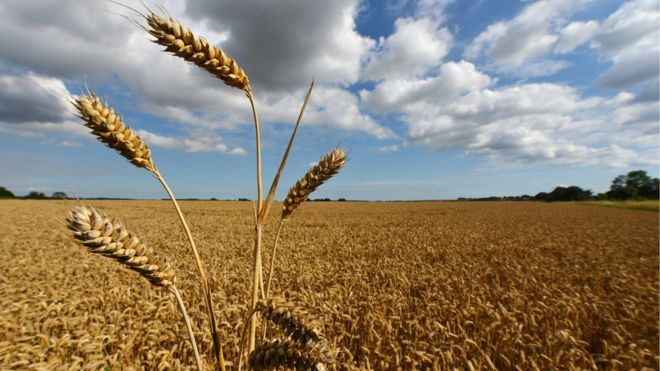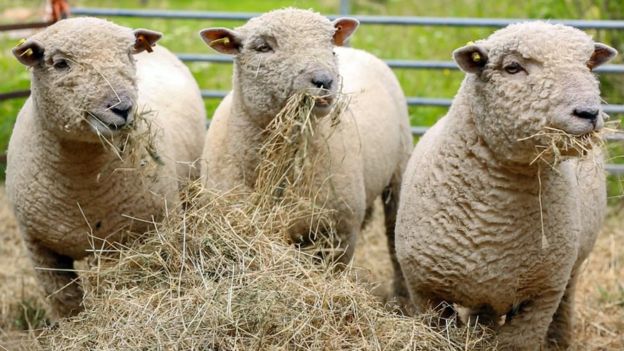
In the UK, wheat is the largest arable crop
A plan to use all of England's farm grants to protect the environment is being diluted, the BBC has learned.
Currently, farmers get a guaranteed EU grant based on the amount of land they farm.
Ministers said that after Brexit they must earn grants by doing things that benefit Nature, like planting forests or capturing flood waters.
But those with smaller farms said the new nature-friendly system wouldn't offer them enough to stay in business.
So, to the alarm of environmentalists, they've persuaded ministers to create a new scheme rewarding them for simple actions such as conserving soil, or keeping pesticides out of streams.
Environmentalists say farmers shouldn't be paid extra for enhancing soil which benefits their business anyway - or for obeying the laws prohibiting water pollution.
But the government has accepted the need for those working on small farms - particularly in the uplands - to be cushioned as the old EU grant system is phased out over the next seven years.
- Why do farmers get paid by taxpayers?
How much are farmers being paid?
Ministers will replace the EU policy with a new system known as ELMS, the Environmental Land Management Scheme.
The new system demands "public money for public goods", and it's won applause from people on both sides of the Brexit debate.
- Agriculture Bill: Soil at heart of UK farm grant revolution
- UK farms plan for going 'carbon neutral'.
But under pressure from farmers, ministers are now drawing up a parallel easy-to-enter scheme - the Sustainable Farming Incentive (SFI) - to reward farmers for basic activities round the farm such as crop rotation.
Environmentalists say actions like this are normal good practice and shouldn't be funded by the taxpayer.
They say the easy-to-do actions under the SFI will divert taxpayers' cash from bigger landscape-scale changes such as re-wilding under the more ambitious ELMS.
But farmers are relieved - they say with Brexit uncertainty it's important for them to secure some income without too much difficulty.
What do farmers want?
Those with small farms take a very different view - they're relieved that the government is looking to find a way of keeping their businesses afloat - for the time being, at least.
Phil Stocker from the National Sheep Association told BBC News: "Most livestock businesses have ended up through the years being dependent on support (subsidy). Any change is going to cause a lot of uncertainty.
"We'd like to be paid for really good soil management that protects soil life; for good management that stops nutrients and soil going into water courses; for managing hedgerows and looking after trees. They cost the business, and we know the public love these environments."
The head of Natural England, Tony Juniper, added: "It's right to have some level of the scheme available to all to contribute something through soil management, water management, maybe trees. These are all things pretty much all farmers can join in with."

Britain has a long history of sheep farming
Some farmers are also pushing the government to reward them for contributing to secure supplies of food - so-called food security; or for producing artisanal local foods.
They argue that the public also wants to see small farms stay in business, so this should also be regarded as a public good.
A debate is bubbling about whether these constitute public goods or not.
Farmers and campaigners alike agree on the need for urgent decisions from a government preoccupied with Covid-19.
Tom Bradshaw from the farmers' union NFU told BBC News: "We are just lacking clarity now at an incredibly important time in terms of a new trade agreements; Brexit deal; new immigration policy; and (farm grants) transition. There's so much uncertainty in the industry. Farmers can't plan. We desperately need clarity."
A Defra spokesperson said: "The Environmental Land Management scheme will create cleaner, greener landscapes, helping build towards the government's environmental goals and net zero commitments.
"As we phase out direct payments ahead of the full roll out in 2024, we will offer financial assistance to help farmers prepare, and invest in ways to improve their productivity and manage the environment sustainably."
Words
protect-to keep someone or something safe from something dangerous or bad
benefit-to help someone
Comrephension Quiz
How do people with small farms take a very different view~?